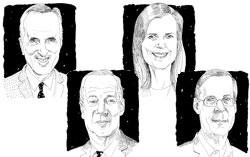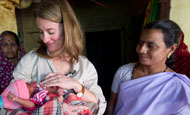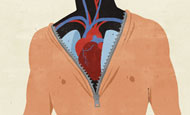FALL 2012
BACK ISSUES
Online versions of the magazine from 1999 to present are still accessible. BACK ISSUES »


Download Printable Issue (PDF)
Alzheimer's risk
The most common genetic risk factor for Alzheimer’s disease disrupts brain function in healthy, older women but has little impact on brain function in healthy, older men. MORE . . .
Rare window
Life with a rare disease can be isolating, but a new film shows how patient-advocacy groups can provide a support network and spur researchers to look for cures. MORE . . .
New digs for kids
To keep pace with the growing numbers and needs of young patients, and the needs of Northern California’s expectant mothers, Lucile Packard Children’s Hospital is growing, too. MORE . . .
Ow in the family
Opiates are the mainstay medication for easing pain, but because of side effects they don’t work well for everyone. Now a Stanford study shows that susceptibility to the worst of these side effects runs in families.
MORE . . .
Totally rad
“It took us three years and 750 tries to make it work, but we finally did it,” says postdoctoral researcher Jerome Bonnet, PhD, who helped engineer a genetic equivalent of a binary digit — a “bit” in data parlance. MORE . . .
Community good
Government-funded community health centers, provide better care than do private practices. That’s the surprising conclusion of a study by professor of medicine Randall Stafford, MD, PhD.
MORE . . .
Cochlear kids
Doctors routinely give cochlear implants to deaf children as young as 1 year old. But what if children show signs of mental retardation and might never learn to talk? MORE . . .
Lasker for Spudich
Stanford biochemist James Spudich, PhD, received the 2012 Albert Lasker Basic Medical Research Award for his investigations of the body's molecular motors. MORE . . .
Letter from the dean
Passing the torch
THE BACKSTORY
PG
















